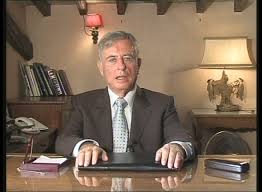Abdul Halim Khaddam, the former deputy to the Syrian president who defected from the Syrian regime in 2005, stated that Western countries should not fear that the fall of President Bashar al-Assad would lead to the emergence of an extremist Islamic regime.
In exclusive statements to the London-based newspaper “Al-Sharq Al-Awsat” during a visit to Brussels, where he held a press conference discussing the developments in his country, Khaddam emphasized that “international parties should stop expressing fear of the rise of fundamentalist extremism leading Syria because Syrians, both Muslims and Christians, are religious but not fanatical. They must realize that covering up the regime under this pretext, and the regime’s continuation in its repression and tyranny, will transform moderation into fanaticism.”
He argued that these countries should assist in forming an international investigation committee and referring the investigation file to the International Criminal Court to hold those who ordered, planned, and executed the killings accountable. He emphasized that military operations are not the solution.
Khaddam, who arrived in Brussels late last week to hold a press conference addressing the developments in his country, affirmed that Syrians do not need any international military intervention to help them get rid of the regime. However, he added that “Turkey has a vision regarding the issue of reform in Syria, but what the Turkish leadership may not agree on is toppling the regime and building a new system.”
Khaddam accused the current Syrian regime of “contributing to the fueling of sectarian tension” in the country. During his meeting with journalists at a hotel in the Belgian capital, Brussels, he pointed out that Syria had not experienced any sectarian tension before, “but the practices of the current regime have led to this situation.”
He expressed his conviction that “Syrian youth will continue their protests and achieve their goals,” stating that “these young people have no affiliation with any party or any group of any kind.”
He leveled a series of accusations against the Syrian authorities, including “corruption, the monopoly of power, the suppression of freedoms, and the weakness of economic management,” which led to the youth’s movement. He added that the success of the revolutions in Tunisia and Egypt also played a role.
Khaddam explained that “all opposition parties support peaceful movements on the Syrian street, and they do not accept any external interference in the country’s affairs.”
He accused Syrian President Bashar al-Assad of “providing support to the regime of Colonel Muammar Gaddafi,” while criticizing the positions of Arab countries, saying, “Arab countries that support the Libyan opposition are the same ones that support President Assad.”
In response to a question about his political past, where he was one of the most prominent figures in the Syrian regime for many years, Khaddam said that he had offered advice to Syrian President Bashar al-Assad and provided him with many suggestions to address the situation. However, he claimed that President Bashar ignored all his proposals.
He claimed that his decision to defect from the Syrian regime came “out of concern for his country, Syria.”
Khaddam expressed his willingness to stand trial, stating that he does not fear defending himself against any charges that may be brought against him.
He believed that the real crisis in Syria lies in the nature of the regime that has governed Syria for four decades, monopolizing power, making unilateral decisions, and marginalizing the role of the people. He argued that the use of all means of oppression and its institutions had led to the emergence of sectarian tensions.
He stated, “The issue is not about buying time or making decisions to appease this or that direction in an attempt to absorb popular resentment. The issue lies in changing this regime, holding its officials accountable, and returning to the path of democracy established by the Syrian founding fathers, which was overturned by military coups.”
Khaddam expressed his belief that “the regime will change,” and he added, “From my perspective, it will happen. It is natural for Syrians to go through a series of stages, but they will all contribute to achieving the ultimate goal, and the variation in slogans sometimes does not lead directly to declaring the main goal. This is due to the nature of the stage and the complex circumstances experienced by the Syrian people.” He concluded, “We must help them extract the requirements of each stage, and everyone should be an aid to them, not a burden.”




